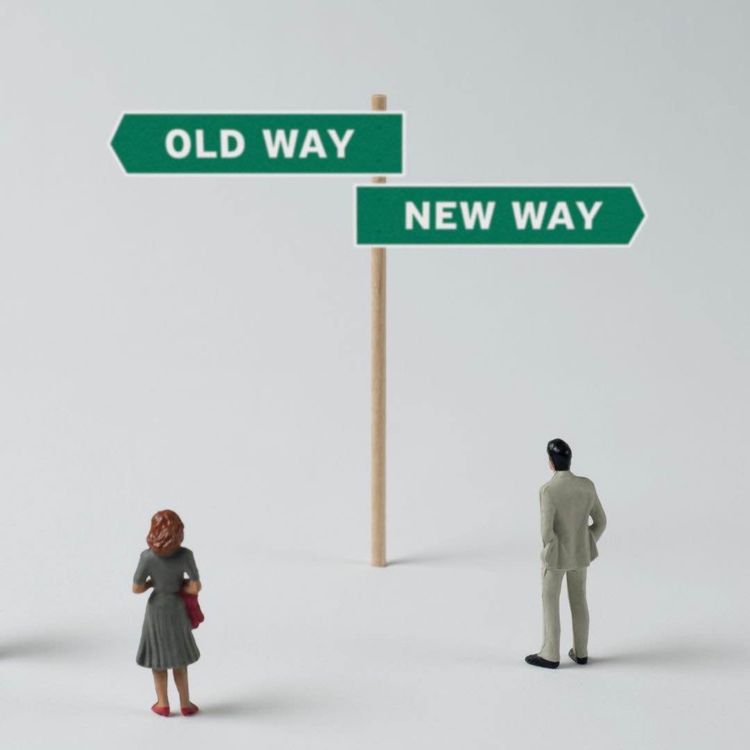Share

Coaching York Podcast
Living and Thriving with ADHD
“I approach life differently now.”
In the second of our podcasts on ADHD Helena shares her own experience of living with ADHD and how her life changed after she received her diagnosis.
She goes on to explore how coaches can support leaders who manage people with ADHD, including taking the opportunity to promote neurodiversity in the workplace, and other sources of support - such as Access to Work – which are readily available for organisations and their employees.
Helena explores in greater detail ADHD challenges, such as memory and time blindness, and the insights we can apply when we understand the difference between an “interest driven” brain, and an “importance driven” brain.
To contact Helena for coaching or coach supervision, resources to understand ADHD better and other sources of help, visit her website HATCHED coaching.
More episodes
View all episodes

Empowering Women - Root Deep Stand Strong Branch Out
39:02|What drew Bryony Rowntree to coaching? In particular, what led her to coaching women making the transition from maternity leave back into the workplace? Join Geoff in conversation with Bryony as she shares her story of parenting, living in Zambia, working as a live-in carer, to developing expertise in safeguarding, coaching, and mental health first aid. Bryony talks about how she was drawn to coaching, the difference she wants to make in the world, and her particular desire to support women juggling the multiple priorities of parenting, work - sometimes additionally looking after older relatives - and the need to look after themselves. We explore the family and cultural influences on her view of the world and how these impact on her coaching practice, commitment to the safety and care of her clients, and the different perspectives she is able to draw on.Hear stories of what it’s like to work with Bryony and the impact she has made in the life of her clients.The podcast also explores Bryony’s strapline - Root Deep, Stand Strong, Branch Out, and join her and Geoff in with one of her guided visualisation exercises.For more details about Bryony’s wider work in:CoachingBack to Work ProgrammeMental Health First Aid Training; andExtensive range of resourcesGo to Bryony’s website bryonyrowntree.com and sign up for her newsletter.
Overcome Your Inner Saboteur Part 2. Alex Patient
22:32|Overcoming Your Inner Saboteur Part 2With Alex Patient and guest host Mike HickmanYour inner hyper-critic may have been really helpful in motivating you to achieve some of your life and career goals. But is there a better, healthier, and psychologically safer way of achieving those goals? What would life be like if there was?In this podcast we continue our conversation with Alex Patient as he explains further his coaching approach to dealing with imposter-like feelings - taming our inner saboteur.In the last episode Alex explained how he works with clients to identify and describe the characteristics of the saboteur. He now develops his approach to combatting it by:Identifying the triggers that lead to the imposter coming out.Acknowledging that whilst your imposter will never go away, it can be managed in increasingly better ways.Understanding where trying conform to the expectations of other people can inhibit your own preferred working style.Recognising the impact of your working environment.Shaping your own working culture - you may have more power to do this than you realise, by clear what you stand for as a colleague or leader.In our final section we explore what clients take with them out coaching sessions with Alex that help in their day to day lives. Alex outlines a number of practical steps that you can take.Alex leaves us with the following challenge. Since we can disempower imposterism by speaking about it, which one person in your network would benefit from a conversation about the subjects raised in these podcasts? You may be giving them the opportunity to start the journey of dealing with their own imposter. Contact AlexFind out more about Alex’s work on his website PatientMind.Contact Alex at patientmindcoach@gmail.com.You can book a free one hour taster catching conversation with Alex, and enquire about his other services here.Community First YorkshireWe are pleased to welcome back Mike Hickman from Community First Yorkshire as our guest co-presenter.About Coaching York and the PodcastCoaching York is a community of coaches serving various communities businesses and organisations, especially in York and North Yorkshire. The Coaching York Podcast is curated and edited by Geoff Ashton in support of Coaching York’s mission to extend the reach of coaching, to enable more people to live its benefits.
Overcoming your Inner Saboteur (Part 1). With Alex Patient
21:55|Overcoming Your Inner SaboteurWith Alex Patient and guest host Mike HickmanHow often do you feel that you don’t really belong in your role - your self-evaluation is “I’m just rubbish; my reputation is undeserved; any day now they will find me out. ”Do you still feel this, even in the face of evidence that you really can perform the role you are in? Who is this saboteur who is seeking to undermine you? What does it say, feel like or look like? What name do you give it?Alex Patient formerly led the Performance Insight Division at Nat West. He describes himself in that role as “feeling a fraud everyday.” Two years ago he began his own business as a coach to individuals and groups, a leadership trainer and facilitator. Alex works mainly with analytically minded people in middle and senior management. Drawing on his own experience as an analyst and manager, and from his practice as a coach, Alex describes the lived experience of imposter-like feelings including:Why “imposters” seek to hide what’s really going on under the surface.How wanting to show that he always had “all the answers” made him a less effective leader.The false idea that reaching out for help is weakness.How liberating and catalysing it is for a senior leader to say “I don’t know.” Whilst we explore some of the social, family and structural factors that contribute to people experiencing imposter-like feelings, Alex is clear that more important than understanding the drivers to imposterism is what we do about it. With that in mind, Alex goes on to describe strategies for dealing with these inhibitors including:Replacing a default attitude of being defensive with one of being curious.Using his coaching skills to help clients “separate out this imposter-like character from who they really are” to make space for more positive aspects of someone’s character to take the lead.How to see, at a granular level, what this internal imposter says about you, using visualisation to form a rounded picture of this saboteur to describing in detail situations in which the saboteur shows up.What it’s like to experience coaching around exposing your saboteur and the immediate benefits clients experience in doing it.We conclude this podcast with Alex describing an approach he uses to allow him, in real time, to put his inner saboteur in its place, subordinating its power to his inner leader.Tune in to our next podcast as Alex describes the other aspects of his approach to helping people address their inner saboteurs.Contact AlexFind out more about Alex’s work on his website PatientMind.Contact Alex at patientmindcoach@gmail.comYou can book a free one hour taster coaching conversation with Alex, and enquire about his other services here.Community First YorkshireWe are pleased to welcome back Mike Hickman from Community First Yorkshire as our guest co-presenter.Community First YorkshireAbout Coaching York and the PodcastThe Coaching York Podcast is curated and edited by Geoff Ashton in support of Coaching York’s mission to extend the reach of coaching, to enable more people to live its benefits.
First seek to understand - Working with different ways of being. With Dr Mike Hickman from Community First Yorkshire
30:03|Join Fiona and Geoff as we speak with Mike Hickman, Leadership Development and Training Manager at Community First Yorkshire.Trained as a drama and TV actor, Mike has also had a long and varied career in secondary and tertiary education as a teacher and lecturer. He has had various roles in the mental health, voluntary and community sector - including income generation and working for better mental health - and is now focused on developing people and leadership, through training, mentoring and coaching. Mike still acts and writes, and is currently acquiring a professional qualification in coaching.Mike and Fiona discuss their personal and professional experiences of ‘working with difference’, and understanding the various ways in which people express their uniqueness. They share powerful examples of the value of understanding how different people relate to the same situations, process differently the same information, and the perils of superimposing normative expectations. Mike speaks openly about his own experiences of mental health and how these have shaped both his own way of being in the world, and his approaches to understanding other people.The conversation includes:The benefits and downsides of being open about mental health diagnoses and labels.How Mike’s knowledge and experience of mental health and mental ill-health affects how he works as a leader.Mike and Fiona’s experience of challenging norms - as challengers and being challenged.False equations - such as why not making eye contact can mean the opposite of “I’m not listening to you”.What might be behind the phrase, used in a professional context: ‘You remind me of me.’What we can learn from Kate Dean’s insights on the norm of ‘social competence.’A conversation with Geoff focused on how Mike manages his inner world when meeting new people and managing energy levels in a busy and demanding environment.What we can learn from the concept of ‘psychological safety.’And a question to take away - from Mike to the coaches in our listening audience.Coaching York is in partnership to deliver the CFY mentoring programme, and coaching, for leaders in the North Yorkshire VCSE sector.Connect with Mike on Linkedin.You can find out more about Kate Dean’s work at Enable Disability and Inclusion.Next EpisodeOur next episode will be published in the week of July 8th.About Coaching York and the PodcastCoaching York is a community of coaches serving various communities, especially in York and North Yorkshire. The Coaching York Podcast is curated and edited by Geoff Ashton in support of Coaching York’s mission to extend the reach of coaching, to enable more people to live its benefits.
Metaphor
25:08|Have you noticed how often you use metaphors in your daily conversation? How often do you use them when you talk to other people - or to yourself? Geoff is joined again by Jeremy J Lewis who together explore four ways a coach might work with a client's use of metaphors:Using a 'Clean Language' approach - only using the client's own works when, in conversation, the client uses a metaphor that the coach particularly notices.Asking the client consciously to come up with a metaphor of their own to describe a situation or experience.Working collaboratively with the client's metaphor to explore its deeper possible meaning and significance.Suggesting an alternative to the client's metaphor to open up new avenues of thought.During the Pod you will hear a worked example of Clean Language exploration of a metaphor, how much more there is to thinking about 'balance' than you perhaps realised, and what happens when you turn a crossroads into a roundabout.If you have a favourite metaphor of your own, please share it with us on Linkedin, or email to mail@coachingyork.co.uk. Contact Jez to discuss coaching or coaching supervision, or Geoff to find out more about coaching, Coaching York or podcasting.
How do you make your decisions? How else could you make your decisions?
05:48|What’s your decision making mantra? Is it:Get the facts - the answer’s in the data.Try before you buy - your experience tells you what you need to know.Trust your gut - the answer is within you.Check the trends - the answer is out there.Put it off - there’s always tomorrow.Explaining these five decision making styles, Geoff invites us to ask ourselves the question - is this more like me or less like me? You will gain insights into:How understanding these styles can help decision making in groups.Your choices in the way you make choices.Why it is that the ways you make decisions at work, may be different to the ways in which you make decisions in your personal life.
Conversation with Cybersage Part 2
26:26|Would you like to work with an AI coach? What would that experience look like in practice? Can and AI make an effective coaching supervisor? Is AI a threat, or potential benefit, to the human coaching industry?In this second “conversation" with Cybersage, Rachel Anderson and Jeremy J Lewis explore:The various ways an AI coach can enhance human practice, in particular the capacity to analyse large volumes of data from which to inform the shape of individual coaching sessions and tracking client responses over time.Rachel’s experience of working with an AI coach to prepare for and debrief from a coaching conversation, and how she has used other (non coaching) AI providing analysis and feedback to clients in the moment and using that data as part of her coaching session.The current gap between AI and human coaching.What Cybersage thinks about the ability of AI to act as a coaching supervisor and our host’s views about its claims.How AI can contribute to the growth of the coaching market and individual coaching practices, and how Rachel is using AI to summarise coaching sessions and wider business planning.Links to external resourcesReferred to by CybersageSentiment AnalysisKey Phrase Identification (Extraction)Comparative AnalysisUsed by RachelPoised. AI tool to give you real-time data and feedback on your communication in online meetings.Read AI can give great data and feedback on communication, together with coaching tips – it will record and transcribe, and give analysis of the meeting – but it works by joining the Zoom meeting as a participant, so can feel more intrusive.About Jeremy and RachelJeremy is coach, coach supervisor and podcast host for Coaching York. Find out more about his work on his website Grow the Coach and follow him on Linkedin.Once growing trees as a forester, Rachel now helps people to grow instead as an executive and leadership coach. Founder of Tea & Empathy – a company that aims to challenge much of the conventional narrative of the personal development world (that inadvertently feeds self-criticism and inadequacy), and instead promote personal growth through self-compassion, self-acceptance and sense of agency. She describes herself as a social introvert, and is the author of “Introversion & Leadership; Practical Strategies for Being at Your Best”, available from Amazon. Follow Rachel on LinkedInProduction notesWe asked ChatGPT to answer a series of questions, and turned the text into speech using Natural Reader Text to Speech.This show is curated and produced by Geoff Ashton - contact at mail@coachingyork.co.uk
Crossing the chicken line. Finding courage through self-coaching. With Jenny Sharp
17:59|When was the last time you agreed to do something, discovered it was going to be more challenging than you thought, but came to point where you just had to tell yourself: “I can do this!”How can we address better those challenges where we feel the fear and do it anyway? Geoff is joined by career coach, adult educator and maths tutor Jenny Sharp. Jenny shares her experience of discovering, honing, and using self-coaching techniques to manage stressful and demanding situations. In particular Jenny shares how she prepared for an upcoming (and particularly stressful) whole day event using the novel technique of a video diary to record her emotional journal throughout the experience. Jenny shares how she was able to see her emotional responses changing throughout the day, how her confidence grew, and the reassurance this has given her in facing other challenging situations. Jenny goes on to explain how this technique has helped her clients, and how we can, with practice and some help from her to get started, use it ourselvesJenny says: “It’s pretty obvious that we can’t have access to a coach every minute of our lives even if we wanted to. So I’ve found it’s really helpful to create a bank of techniques we can use to coach ourselves.” About Jenny"As a specialised coach for women in male-dominated environments, I understand the unique challenges you face. With a focus on building confidence, improving communication, and resolving conflicts, I create a safe and supportive space for you to explore your thoughts, feelings, and goals without judgement. My personalised approach ensures that each session is tailored to your individual needs, empowering you to gain clarity, rediscover your passion, and unlock your true potential."Jenny's websiteYou can see the tiktok video Jenny refers to here.And here’s the “before and after” YouTube version.~Jenny's video "how to" guideGet in touch with Jenny through Linkedin.
An AI's view of the future of coaching
31:19|Coaching - With AIWhat does AI think about…… AI? In the first of two podcasts, Jeremy J Lewis and Rachel Anderson discuss the growing impact of AI on coaching practice. A second episode goes on to explore AI and coach supervision, and its impact on the coaching industry.We asked ChatGPT to assume the persona of a professional executive coach, which named itself Cybersage. Jeremy has begun to research the potential of AI - Rachel has begun to use it herself in her own coaching practice. We welcome Rachel as both guest and co-presenter for these two podcasts. In “conversation with” and reflection on the comments of Cybersage, Jeremy and Rachel explore:The objectives, methods, and rationale an AI could would use. How an AI would seek to overcome the challenges of emulating the human touch when coaching.Programmes AI can use to understand and interact with humans, such as Natural Language Processing, and Emotion Recognition Technology.Different styles of response from AI depending on the brief we give it.Real time responses from Cybersage to questions from our hosts. AI and ethics, especially confidentiality.How human coaches and clients can shape their relationship with an AI bot.How AI can help a human coach's own professional development.Why Rachel is excited, rather than threatened, by the potential of AI.How comfortable would you be using Cybersage as a coach or thinking partner?About Jeremy and RachelJeremy is coach, coach supervisor and podcast host for Coaching York. Find out more about his work on his website Grow the Coach and follow him on Linkedin.Once growing trees as a forester, Rachel now helps people to grow instead as an executive and leadership coach. She’s also the founder of Tea & Empathy – a company that aims to challenge much of the conventional narrative of the personal development world (that inadvertently feeds self-criticism and inadequacy), and instead promote personal growth through self-compassion, self-acceptance and sense of agency. She describes herself as a social introvert, and is the author of “Introversion & Leadership; Practical Strategies for Being at Your Best”, available from Amazon. Find out more about Rachel by following her on LinkedInProduction notesWe turned the text of ChatGPT's answers into speech using Natural Reader Text to Speech. The links to external resources are suggestions for further reading. This show is curated and produced by Geoff Ashton, Director of C21 Coaching and a member of Coaching York. You can contact Geoff through Coaching York.